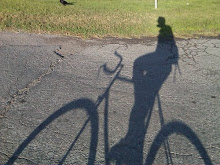An interesting discussion has cropped up over at the Carfree Cities list serve associated with Carfree.com about how all us bicycle and carfree advocates can reach people under 24.
Its a challenging proposition since I feel like my generation is so full of contradictions. We are simultaneously one of the most self-centered, self-absorbed generations while also becoming one of the most engaged and informed age groups. A recent report from the UK found that people in their twenties waste the most energy and have the least knowledge about energy use. At the same time people from my generation greatly involved in trying to push for change regarding energy policy, climate change, and so on. Many are in fact giving up their cars and trying to live in simpler ways. And this trend is being noticed in a lot of media, such as here.
I don't think that a large generalization about car-free being a new trend among young people can be made. Certain cities and areas of the country are seeing an amazing amount of growth in non-motorized transportation, but at the same time large segments of the country are still not experiencing such a cultural shift.
We also can't think of the "young" as being a monoculture. Here in Missoula, MT there are two high schools with two different cultures. One is set in our urban core with almost no parking; most of the students walk, bike, or take our public transit (since there is no room for school buses to park and drop off kids). There must be between 100-200 bikes parked at the high school ever day. The other is more suburban, and has a parking lot the size of several football fields with kids getting there with either a vehicle, dropped off by parents, or on a school bus.
Local culture is probably the most important factor. If there is no bicycle culture present in a city, the work that must be done to get people on board with bicycle transportation and for them to see the need to get out of the car is hugely increased. All the blogs, books, and newspaper articles written about the new trend, environmental, and health concerns will do little.
Much of the cultural change that is taking place is happening in cities that already had a significant bicycle culture presence and that culture has finally grown in numbers to become more important and more visible. I agree that social interaction person to person is probably the most powerful and effective way to spread such ideas. Having that local culture that someone can connect to, have fun, learn new things, meet friends, and become engaged is important because without those opportunities all the information that is being put out there wont inspire anyone.
My experience is that a lot of books about such things are read by people that are already interested in the subject or are already believers. The same with blogs are true, many of my readers and the people that comment are themselves activists and other bloggers. Such things are aids to spreading such cultural ideals as being car-free or living in an environmentally responsible manner but cannot replace the influence of friends, family, and local community.
1 day ago





4 comments:
Great post - it got me thinking about how all the biking I did as a kid impacted my adult transportation choices.
Check out: http://fiftycarpileup.blogspot.com/2009/10/bicycle-imprinting.html
Ya'll need to start a bicycle collective in town. These social spaces have literally kick started the entire bicycle culture in Los Angeles, took over my college campus in the four years I was there, and provide exactly the person-to-person impetus youre recommending. There are spaces all around the country now...I'm surprised there isn't one in Missoula.
Ramonchu... Missoula does have a bicycle co-op that has been around for over a decade.
I wasn't speaking about a specific place, but generally about how change such as giving up ones car is really a bottom-up process. It takes local culture, infrastructure, and social networks for support and growth of such ideas, just like the local food movement and the growth of farmers markets in the last decade.
But that obviously means that not all American cities are going to have the necessary ingredients to support such cultural change.
Interestingly enough both of my children are part of the Gen Y and get it. My son lives car free by choice in larger cities. Currently in Boston. He did call the other day about getting a bicycle to get around on. My daughter is involved in protecting the environment via hands on. She is currently living a low impact lifestyle in a state park and teaching environmental awareness to local school children through an outreach program.
So there is hope.
Aaron
Post a Comment